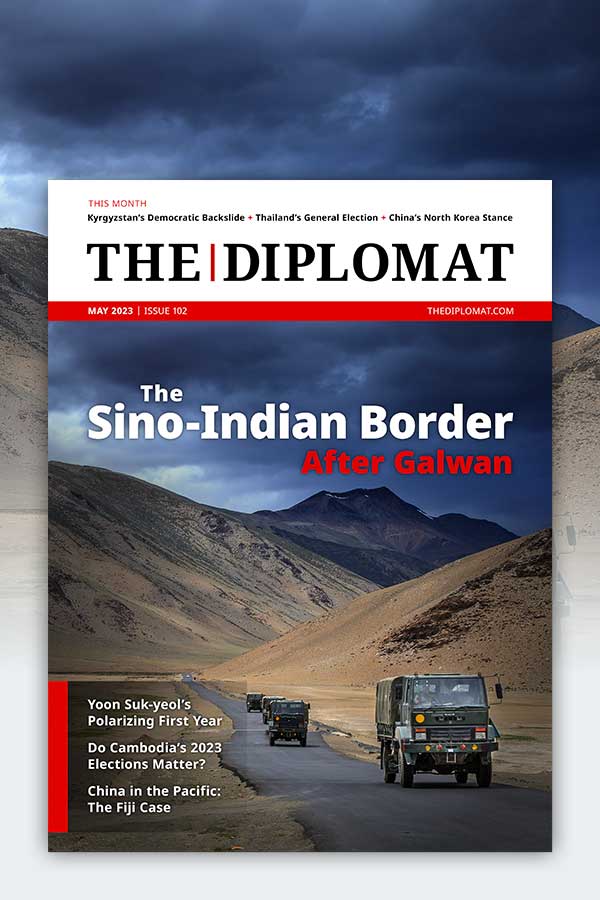| Welcome to the latest issue of Diplomat Brief. This week our top story tells the stories of five people who narrowly escaped death at the hands of Myanmar’s military. We also have an interview with Michael Kugelman, the director of the South Asia Institute at the Wilson Center in Washington, D.C., on India-Pakistan relations following the Pakistani foreign minister’s trip to India last week. |
| Story of the week | ![[object Object]](https://thediplomat.com/diplomat-brief/2023/vol19/images/feature.jpg) | Society Great Escapes From the Clutches of the Myanmar JuntaWhat Happened: The brutal campaign unleashed by the Myanmar military to crush the resistance movement has involved bombings, raids, burning of villages, and massacres of innocent civilians. The atrocities have forced thousands of people to leave their homes and relocate to safer zones. Buried in these incidents are numerous individual stories of people who narrowly escaped from being apprehended and slaughtered by the military. Reporter Rajeev Bhattacharyya spoke to five such people, some in refugee camps in India and some in camps for internally displaced people in Myanmar. Our Focus: Each story reveals a different facet of the Myanmar junta’s bloody war against its own people since the February 2021 coup. One woman escaped after the military captured her and other villagers to serve as human shields for Myanmar forces. Two others managed to escape a military attack on their villages – one was forewarned by resistance forces, and the other, in an even more harrowing tale, recounted seeing soldiers setting houses on fire and hearing gunshots as he fled his home. One man ran for his life when soldiers prepared to execute him and other civilians who had attempted to flee a razing of their village. And one escapee defected from the army – and barely escaped with his life. What Comes Next: Similar stories of brutality and bloodshed are playing out across Myanmar every day. The result has been a massive surge of refugees fleeing into neighboring countries, as well as internally displaced people forced to live in temporary shelters within Myanmar. Now, the survivors face difficult choices: whether to put down roots in a foreign country or hold on to the dream of returning home. Read this story |
| Behind the News | INTERVIEW Michael KugelmanMichael Kugelman, the director of the South Asia Institute at the Wilson Center in Washington, D.C., on how Pakistan’s crises at home are impacting its foreign policy: “With the emergence of Pakistan’s ‘polycrisis,’ it is further downgrading its focus on India in its foreign policy. Simply put, with so many acute crises playing out at home, it literally can’t afford a fresh crisis – or even serious tensions – with India.” Read the interview |
| This Week in Asia | Northeast Asia China’s FM on Europe TourChinese Foreign Minister Qin Gang is in Europe this week, visiting Germany, France, and Norway from May 8-12. It’s the latest in a flurry of exchanges between China and European countries, marking a renewed push by Beijing to keep Europe from fully aligning with the United States on China policy. China’s recent promise to more actively pursue a peace deal in the Russia-Ukraine war – starting with a long-awaited phone call between the Chinese and Ukrainian presidents last month – is part of that strategy as well. But it remains an open question whether European governments will be willing to look past China’s open embrace of Russia. Find out more | South Asia Imran Khan Arrested in PakistanPakistan’s former Prime Minister Imran Khan was arrested in Islamabad on Tuesday, as he made a court appearance in a corruption case. Khan, who was ousted in a no-confidence vote in April 2022, has consistently rallied massive crowds since then. He alleges that his ouster was part of a U.S.-led conspiracy and has been agitating to demand immediate elections. Khan’s supporters have already begun protesting to demand his release, and his continued detention threatens to tip the country into a full-blown political crisis. Find out more | Southeast Asia ASEAN Leaders Meet in Labuan BajoLeaders from nine ASEAN member states – Myanmar’s military junta is once again not invited – will gather this week in the quiet Indonesian port town of Labuan Bajo for the 42nd ASEAN Summit and its related rota of meetings. The agenda of the May 11 summit will look familiar to anyone who has followed ASEAN meetings in recent years. The South China Sea is likely to figure prominently, following a recent rash of tense encounters between Chinese and Philippine vessels in disputed waters. The metastasizing conflict in Myanmar has also become a perennial topic of discussion at ASEAN summits. The depth and complexity of the latter challenge was driven home by an attack this week on an ASEAN humanitarian convoy in western Shan State, giving the bloc’s leaders much to think about ahead of the summit. Find out more | Central Asia Uzbek President Calls for Snap ElectionDays after securing his preferred constitutional revision in a vote observers say “took place in an environment short of genuine political pluralism and competition,” Uzbek President Shavkat Mirziyoyev has called for early presidential elections – now set for July 9. The snap election will most certainly hand Mirziyoyev a fresh seven-year term, after the constitutional revision reset the clock on term limits. Find out more |
| Visualizing APAC |  | The border crossing between Afghanistan and Tajikistan has remained shut since the Taliban power grab in August 2021, shattering the livelihood for vendors in communities on both sides of the Panj River. See the full picture |
| Word of the Week | Security 蚕食Cánshí, Mandarin for “silkworm eating” or “to eat like a silkworm.” In strategic parlance, it’s China’s equivalent to the concept of “salami-slicing.” Find out more |
|  |




![[object Object]](https://thediplomat.com/diplomat-brief/2023/vol19/images/feature.jpg)

